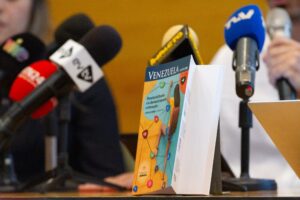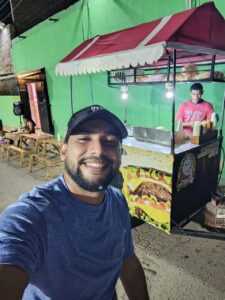*This text was originally published by the Venezuelan digital media outlet Crónica.Uno. Parts of the text have been edited by LatAm Journalism Review, with authorization from the author, for style purposes.
A reduction in staff left Mairet Chourio, a photojournalist with 13 years of experience in traditional and digital media in Venezuela, unemployed.
On Dec. 14, 2023, she received the news that it was impossible to support the entire payroll of the media outlet where she worked for four years, in Caracas.
Another reduction in staff from a digital media outlet is also the reason why Gladylis Flores, a 30-year-old journalist from Bolívar state in southern Venezuela, will have gone without a formal job since 2022.
Since her dismissal, Flores has participated in journalistic and academic projects that only last between three and six months. This and the sale of food [done informally] is the only thing that has brought in money for her in recent years.
Decreased access to information and journalistic coverage, combined with fewer job opportunities for journalists and photojournalists, are some of the consequences of the lack of media in Venezuela.
In 20 years of the governments of Hugo Chávez and Nicolás Maduro 400 media outlets have disappeared, including print outlets, radio stations, television channels and digital platforms, according to the report Situation of the Right to Freedom of Expression in Venezuela by Espacio Público.
And although traditional media are the most affected, digital media currently face their own limitations, especially due to the country's complex economic and political situation.

Gladylis Flores found a way to make money in areas other than social communication and journalism. Selling pastichos [lasagna] gave her the opportunity for a new beginning. (Photo: Gladylis Flores)
“Getting work in the regions is much more difficult, because whether you like it or not, most of the good projects are concentrated in Caracas. The regional media do not have resources and the payment is very bad,” Flores said.
For Chourio, from Caracas, “the outlook is bleak” because there are no opportunities for new income.
“Five years ago I retired from a job in a media company because the salary was not enough and I spent a lot on transportation. After resigning I was only without work for a month. Shortly afterwards they called me from another. But, today things are different,” said Chourio, who has now been unemployed for five months.
Dedicate yourself to other things
Flores found a way to make money in areas other than social communication and journalism. Selling pastichos [lasagna] gave her the opportunity for a new beginning. Furthermore, cooking is a profession that increasingly attracts her attention, although the increase in prices in Venezuela makes the sale complex.
“I was doing very well. I sold them only on weekends. 500 grams for five dollars, the profit was not much, but it was income,” the journalist said. “[On one occasion] some people owed me [money] and I got discouraged. Ciudad Bolívar is somewhat complicated on an economic level, it is a city without sources of production and it is quite difficult for entrepreneurship.”

In 20 years of the governments of Hugo Chávez and Nicolás Maduro, 400 media outlets have closed, according to the report Situation of the Right to Freedom of Expression in Venezuela by Espacio Público.(Photo: Gleybert Asencio)
Chourio plans to look for another job and leave photography aside.
“I want to do it and I'm willing, but I don't have other experience that I can apply to another area. Furthermore, like everything, you have to update your skills, train yourself, but how do you do it if precariousness has led us to live with just enough,” she said.
Fast food and journalism
Jhonattam Petit, a journalist in the state of Falcón, used social networks to say that at night he runs a hot dog cart. This work allows him to “earn his bread,” unlike his profession that he has been practicing for six years but without major financial gains.
Apart from the fast food venture, at 29 years of age, Petit created a hyperlocal journalism initiative that consists of recording audios with news reports that he sends at night to his audience of more than 360 people in a WhatsApp group. He doesn’t make money off of it, but it allows him to remain active within the area of communication.
“I understood that my reality is different and that I need money. I discovered that I can do more than just news articles, I discovered that there is a world beyond communication that is not bad to explore. Having a name as a journalist is not bad, but having money is much better,” he added.
Other limitations
“Keeping digital media functioning has become a sporting arena of exhausting efforts,” said Laura Helena Castillo, journalist and co-founder of El Bus TV.

Jhonattam Petit, a journalist in the state of Falcón, used social networks to say that at night he runs a hot dog cart. (Photo: Jhonattam Petit)
“In Venezuela this situation is even more complicated. Challenges with financing have been increasing to the extent that interest in supporting Venezuelan journalistic projects has decreased for international organizations, not only due to the prolonged local complication, but also due to the emergence of urgent conflicts such as the wars in Ukraine and Gaza,” she added.
For many years, companies have not advertised in Venezuelan digital media, for several reasons: ignorance of the impact of their investment in the digital ecosystem, fear of the political context and preference for social networks as a direct marketing mechanism.
“The large media outlets in the United States or Spain have achieved a number of subscribers that help keep operations running, but in a country like Venezuela, with one of the lowest minimum wages in the world, this is not an option at the moment. The subscription culture will be good news that will probably come with economic improvements,” the co-founder of El Bus TV said.
But the economic factor is not the only thing that digital media in Venezuela face. State censorship through blocking of websites, or impediments to the work of the press, further limit the access and dissemination of information online.
It’s a reality that is evident in the 190 media outlets' website blockings carried out by state agencies and recorded by the non-governmental organization Espacio Público between 2010 and 2022.
Marysabel Rodríguez, researcher and coordinator of Espacio Público´s Social Observatory Program, explains that the greater the level of freedom a digital media outlet has when disseminating information, the more it can become “a target to be repressed.”
“That is why we see so much sensitivity from the authorities or senior officials towards what is disseminated in digital media, because they are the ones who disseminate content that is censored in the traditional media ecosystem,” Rodríguez said. “This increases the risk [of digital media], but it also speaks of the need to protect them, because they are the few free spaces in which quality information can circulate.”